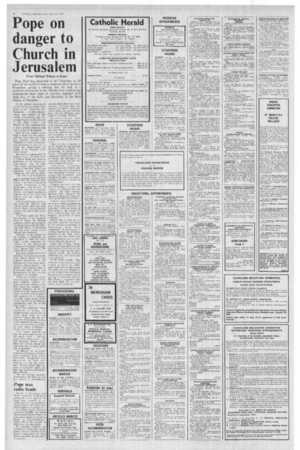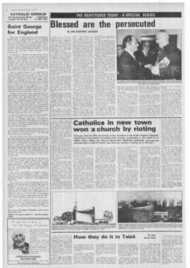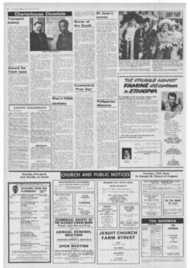Page 8, 19th April 1974
Page 8

Report an error
Noticed an error on this page?If you've noticed an error in this article please click here to report it.
Tags
Share
Related articles
Jewish Free For All
The Pope's Via Dolorosa
Pope: We Can Never Give Up On Peace
New Year's Day Message Urges Global Dialogue
The Vatican Europe
Pope Paul has appealed to all Christians in all parts
of the world to help to maintain the Church in Jerusalem, giving a warning that the lack of a juridical settlement of the Middle East conflict has endangered their right of worship, together with that, too, of the Jews and Moslems, in the Holy Places of Palestine.
In this appeal, announced by the Vatican on April 5 but given as an "Apostolic Exhortation ... to the bishops, clergy and faithful of the world concerning the increased needs of the Church in the Holy Land", on March 25, Paul stressed that it was a purely religious and not a political document.
None the less, implicit in the Pope's words was the anxiety and fear that unless the Holy See, possibly together with Christians of other confessions, was permitted to take part in peace talk adjudications, the cradle of the Christian Faith waS in danger.
This fear was expressed by Fr Roberto Tucci, the Jesuit head of Vatican Radio who acted as spOkesman for the Vatican announcement. when he said: "The reasons prompting this initiative of the Holy Father are essentially two, both closely corinected, one with the other.
The first is of an historical
and theological nature: the Holy maces and the ecelesial community in the Holy Land are of singular importance in the geography and history of salvation, and also on account of 1their privileged association with the life of our Lord Jesus Christ and the origins of Christianity.
'tThe second reason concerns the especially difficult and critical period which the local Church there is going through, which is also due to the recent conflicts.
"The Pope points out: Were the presence of our brethren there to cease, the Shrines would be without the warmth of this living witness and the Christian Holy Places of Jerusalem and the Holy Land would become like museums.'
"Already, in his address to the College of Cardinals on December 15, 1969, the Holy Father openly expressed his 'anxiety at the decreasing numbers of Christians in the ancient regions that were the cradle of our Faith'."
Pope Paul referred in his Exhortation to the -i"nterest in the Holy Places shown "in the highest assemblies of the Nations and by the major International Organisations." He added: "This interest aims at protecting their safety and guaranteeing the free exercise of religion and worship.
"Today this interest is all the more necessary because of the grave religious, political and social problems existing in the Holy Land: the complex and delicate problems of the coexistence of the peoples of the region, of their living in peace, and questions of a religious, civil and human nature which involve the life of the different communities that live in the Holy Land."
Pope Paul continued: "With sentiments of anxiety, yet enlightened by a ray of hope, we recall again what we said recently, namely that the continuation of the state of tension in the Middle East, without conclusive steps towards peace having been taken, constitutes a Serious and constant danger.
"This danger imperils not only the peace and security of the people there and the peace of the whole world but also. threatens certain values which for various reasons are supremely dear to such a great part of mankind.
"In addition, the continuing exIsience of situations lacking a clear juridical basis internationally recognised and guaranteed, far from contributing to a fair and acceptable solution which takes account of everyone's rights, can only make such an achievement mpre difficult, , "We are thinking especially of Jerusalem, the Holy City and the capital of monotheism.
Pope sees radio heads
' Heads of European and North American broadcasting companies were. received by Pope Paul recently to examine plans for the celebration of the Church's 1975 Holy Year, 'which begins on Christmas Eve.
Sir Charles Curran, DirectorGeneral of the BBC, was among those received by the Pope in an hour-long audience at which the theme of "Reconciliation," which will he the keynote of Holy Year, was discussed.
Fr Agnellus Andrew, the well-known Franciscan broadcaster, who is a member of the Pope's Commission on Mass Media, attended the meeting as a consultor. towards which there turn more intensely in these days the thoughts of Christ's followers, and of which, on a par with the Jews and the Moslems, they ought to feel fully 'citizens'."
Speaking of his 1964 pilgrimage to Jerusalem and the Holy Places and of the reasons motivating this pilgrimage, Pope Paul added: "1 his blessed land has thus become in a certain sense the spiritual heritage of the Christians of the whole world, who dream of being able at least once in their life-time to visit it . . .
"But it is also a country in which, besides the Shrines and the Holy Places, a Church a community of believers in Christ lives and works. It is a community which in the course of history has undergone innumerable trials and has suffered painful difficulties. "Internal divisions, persecutions from withoist and, for some time now, emigration have weakened it, leaving it no longer self-supporting, and therefore in need of our understanding and of our moral and material help." Pointing out that it was true that Christianity "is a universal religion, not linked to any one country", the Pope stressed, however, that "alongside the 'history of Salvation' there exists a 'geography of salvation'," And he asked Christians of the whole world to be generous and help the Church in Jerusalem "with the charity of their prayers, the warmth of their understanding and the tangible expression of their solidarity."
Stating that a form of cooperation must be established by the various Confessions in Jerusalem, Pope Paul emphasised: "In this process of coming together. the Christian presence in the Holy Land, together with the Jewish and Moslem presence, can be a factor for concord and peace."
There was obvious, though implicit, fear that any future administration of the City and the Holy Land might be laid upon majority, Jewish and Moslem representation, with Christians in the minority.
In the Pope's words: "This initiative of ours, however, is intended to have no other significance than a religious and charitable one, even though we cannot refrain from Mentioning the particular importance of the question of Jerusalem and the Holy Places a question that has been dealt with in other solemn papal documents."
blog comments powered by Disqus











